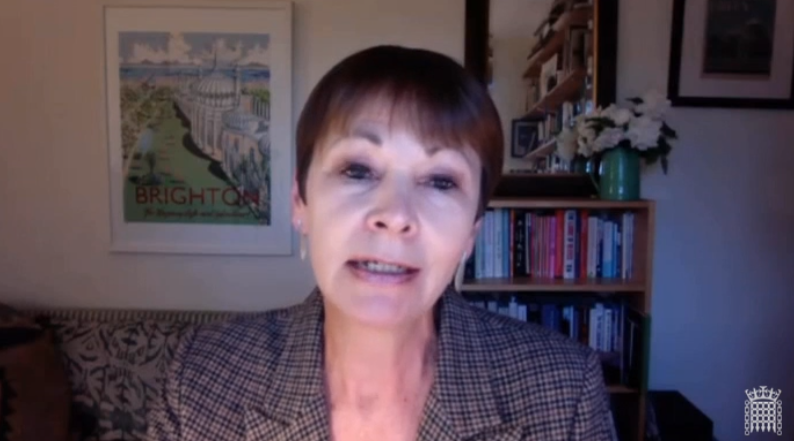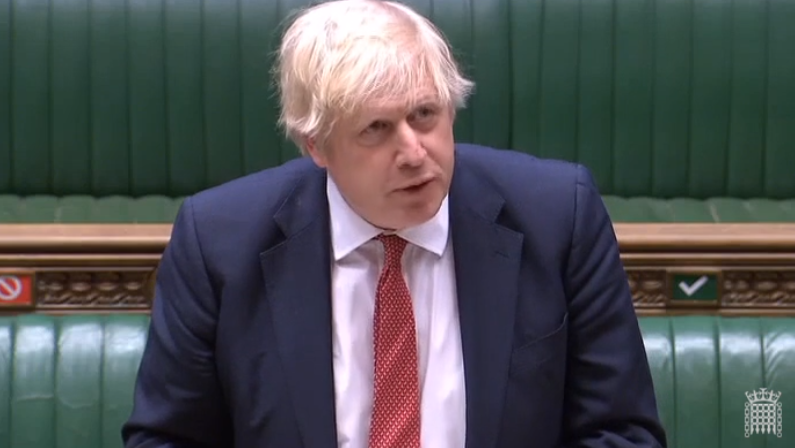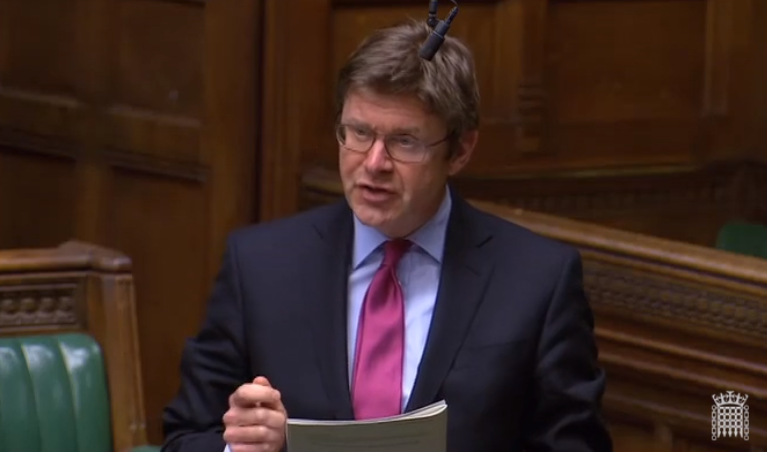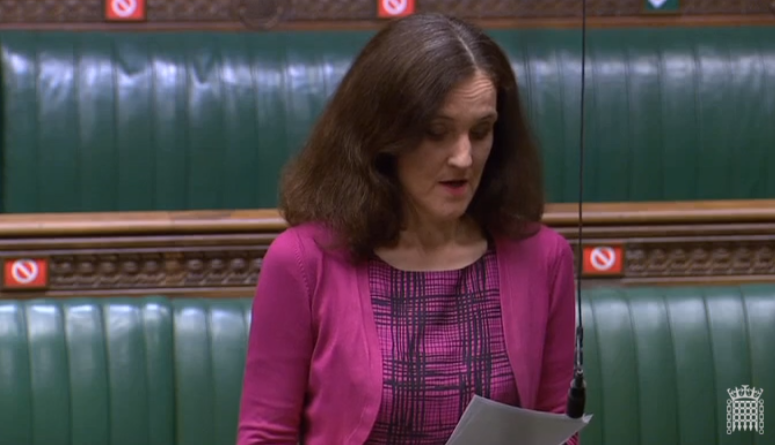The government’s handling of the coronavirus crisis has been labelled a disaster by the Green MP for Brighton Pavilion Caroline Lucas.
And four senior Conservative MPs – all former cabinet ministers – weighed in with serious criticisms during a House of Commons debate.
Caroline Lucas said: “At times of crisis, the opposition should be constructive, but we must also tell the truth.
“The truth is that the Government’s handling of the crisis has been a disaster.
“The public inquiry that will inevitably happen will have no shortage of material to consider: how 10 years of austerity left the NHS struggling to meet normal levels of demand, let alone cope with a pandemic, how chronic fragmentation under the Health and Social Care Act 2012 has in essence contributed to dangerous delays and disorganisation, how learnings from Exercise Cygnus were covered up and – worse – ignored.
“Of course, no government facing challenges of this magnitude will ever get every decision right, but we have to understand how, at every point in this unfolding crisis, this government has made the wrong judgment calls, and their unforced errors have cost lives.
“This is not about having the benefit of hindsight. It is about wilfully choosing to ignore the evidence in front of us, and about British exceptionalism leading ministers to believe that their way is always best.
“We should not wait for an inquiry after the event to learn lessons from such a disastrous approach because getting answers now can help to save lives today.
“In particular, the new track-and-trace operation must learn from the weakness of current top-down, centralised control.
“It must be driven at local level, not contracted out to remote private sector companies, with directors of public health and environmental health officers leading the delivery of a decentralised community-based operation.
“Too many of the Chancellor’s economic support schemes are failing businesses – and in my Brighton constituency they are desperate.
“For example, the self-employed scheme should include small business owners who take their incomes in dividends.
“Allow flexibility for those who combine pay-as-you-earn with freelance work – and stop discriminating against new start-ups and women who have taken time out in the past three years for maternity leave and childcare.
“Businesses need reassurance that the job retention scheme will continue for as long as needed and that the 80 per cent furlough rate will not be reduced any time soon.

“As talk starts about opening up the economy again, it is even more vital that furloughing be made more flexible by allowing short-hours working so that businesses can prepare and by tapering its withdrawal to avoid cliff edges.
“That is critical for sectors such as tourism and hospitality, which are a key part of my Brighton constituency.
“The coronavirus pandemic has turned the world upside down, exposing major weaknesses in our economy and deep-seated inequalities in society, with the most vulnerable hit the hardest. But what we do next could change everything.
“As the world recovers, we have a chance to reset the clock and build back better than before. If we do not, we risk leaping out of the covid frying pan into the climate change fire.
“There should be no going back to normal because normal was intolerable for far too many people, as well as trashing the environment and nature.
“It is vital that the recovery plan decarbonises the economy in a way that also tackles grotesque levels of inequality. A transformative green new deal could create hundreds of thousands of new, decent jobs.
“Let us harness people’s growing recognition of the importance of clean air and green spaces and combine it with a new realisation that when the government choose to, they can spend at speed and scale.
“We should look at evidence that green recovery packages deliver far higher returns than conventional stimulus spending. Programmes such as mass home insulation, thereby reducing emissions and fuel bills, would create jobs throughout the country.
“Let us resolve that there should be no unconditional handouts of public money to prop up carbon-intensive industries.
“Instead, funds should be used to support workers and restructure industries to bring them into line with the Paris climate commitments.
“Finally, we need to listen to the scientists who warned for years that deforestation and the exploitation of wild species have created a perfect storm for the spill-over of diseases from wildlife to people and, having listened, we must act.”

Former Brexit Secretary David Davis, the Conservative MP for Haltemprice and Howden, said: “It is always a privilege to follow the honourable member for Brighton Pavilion (Caroline Lucas).
“May I commend in the strongest possible terms the speech that has just been made by the chairman of the Science and Technology Committee, my right honourable friend the member for Tunbridge Wells (Greg Clark), who has given the best analysis I have heard today of the mistakes we have made? (See below)
“While I am at it, I also commend the chairman of the Health and Social Care Committee, my right honourable friend the member for South West Surrey (Jeremy Hunt), who made a similarly incisive speech earlier. (See below)
“We should be honest. Most of the western nations have handled this crisis badly. They have made mistakes, mostly in being late to control the virus. Not all of them. Some are different.
“For example, Greece, perhaps surprisingly, has controlled it much better than many of the others. It has about 15 deaths per million of the population versus us at about 477 at the moment.
“Those mistakes have cost thousands, if not tens of thousands of lives. A primary mistake, as pointed out by my right honourable friend the member for Tunbridge Wells, was the failure to test, track, trace and contain from the very beginning.
“I would like to speak, in the brief time I have, about what we did once the disease took hold, because I think there are also potential mistakes there.
“The government adopted a slogan – “Protect the NHS. Save lives” – which we all, including myself, took to enthusiastically and enthusiastically signed up to.
“My question is: did the strategy we pursued in good faith to protect the National Health Service exacerbate, in some respects, the death rate?
“In addition to the lockdown, we did four things to protect the NHS and to protect it from being overwhelmed by the pressure on it.
“First off, we asked people with the illness to self-isolate at home and come to hospital only when the symptoms got really bad.
“When they did exactly this – exactly the same thing – in New York City, some of the doctors noticed that the patients were arriving in emergency too late, frankly, to be rescued.
“Their disease had advanced too fast although they could have been cured earlier. My first question is: did that strategy cost lives?
“The second question is: we applied triage on the basis of the so-called frailty index so that people who got a poor score on the frailty index were simply put on palliative care, again partly to protect intensive care unit capacity, so did that strategy cost lives?
“Two members – my right honourable friend the member for Chipping Barnet (Theresa Villiers) and the honourable member for Blaenau Gwent (Nick Smith) – have already raised the question of care homes.
“We discharged patients from hospital early, when some of them still had this disease, into care homes, with the consequences that we have heard in graphic terms already. Did that strategy cost lives?
“The final thing we did to protect capacity was that we cancelled operations for other illnesses – cancer and other illnesses – and that almost undoubtedly cost lives. We can see it in the excess mortality rates.
“Indeed, Britain holds the highest place in Europe, equal with Spain I am afraid, for the highest excess mortality over this period, so the combined effect of these strategies has to be looked at very carefully indeed.
“Bear in mind that throughout this time our intensive care unit capacity was used only to 81 per cent. That is normal for this time of year.
“The Nightingale hospitals stood almost empty and now only 30 per cent of ICU capacity is being taken up by covid-19 patients.
“Did we get this balance wrong? Did we, at the cost of lives, just give ourselves empty beds, rather than doing the best thing for the patients the NHS is there to look after?
“That is not the fault of the staff of the NHS. It is a question of whether the strategy was the wrong one to pursue once we were where we were.
“I finish by coming back to the point made by the chairman of the Science and Technology Committee (Greg Clark).
“The best way to protect both the NHS and the lives of our citizens is the approach taken by other countries, and that is to use testing, tracking and tracing to isolate the illness as well as to bring it down.
“The Prime Minister talked about the R number. That is just an average. The R number in my constituency, a rural area, is lower than that for a care home.”

Earlier the former Health Secretary Jeremy Hunt said: “I support the government’s caution about lifting lockdown and I commend the Prime Minister for being honest about the complex choices we face.
“I want to focus my comments on the quality of scientific advice received by ministers. It is now clear that a major blind spot in the approach taken in Europe and America was our focus on pandemic flu rather than pandemic coronaviruses, such as SARS or MERS.
“Asian countries took a different path. As a result, Korea has had no more than nine deaths on any one day, Singapore is on just 20 deaths in total and Taiwan is on just seven.
“The failure to look at what those countries were doing at the outset will rank as one of the biggest failures of scientific advice to ministers in our lifetimes.
“One can understand the reluctance to look at a totalitarian regime such as China when it dangerously covered up the existence of the virus at the outset.
“But why, when the Scientific Advisory Group for Emergencies was modelling possible responses in January, did it look only at the extremes of total lockdown or mitigated herd immunity, rather than at the middle way of test, track and trace that was being pursued by the Asian democracies?
“That failure led directly to another, namely the advice to stop community testing on (Thursday) 12 March. That meant that we had no idea where the virus was, while countries such as Germany continued community testing and saved many lives as a result.
“A lack of interest in community testing led to another failure at the start of March. Even though infections were doubling every five days, SAGE advised ministers against lockdown and advised them to continue with events such as the Cheltenham Festival and the Liverpool Champions League match.
“That meant that infections soon grew to a point where traditional contact tracing could not cope.
“Of course, ministers have to take responsibility for their decisions. They have a duty to challenge and probe any advice but their decisions are shaped by that advice.
“In that context, it would be totally wrong to blame individuals. Sir Patrick Vallance and Professor Chris Whitty are outstanding scientists and any government would be lucky to have their advice.
“At fault is a systemic failure caused by the secrecy that surrounds everything that SAGE does. Because its advice is not published, it cannot be subjected to scientific challenge. Nor is parliamentary scrutiny possible, even when a government say they are following the science.
“Until last week, we were not even allowed to know who sat on SAGE. We used to have similar secrecy over the interest rate advice that was given to the Chancellor.
“In 1997, the Bank of England was made operationally independent, lines of accountability were clarified and advice was made transparent. Since then, inflation has not troubled the British economy.
“Had SAGE’s advice been published in January, an army of scientists from our universities could have challenged why test, track and trace was not being modelled. They could have demanded a ramp-up of testing and challenged the behavioural assumptions that delayed lockdown.
“We cannot know for certain but the result may well have been better subsequent advice and many lives saved.
“British science is world-beating because we have always championed inventiveness and encouraged challenge so let us sweep aside the secrecy that surrounds SAGE and publish what it recommends, including dissenting views.
“In that way, we will harness the robust exchange of ideas, which has always been one of our greatest national strengths, and, as the Prime Minister said yesterday, come out of this crisis wiser and stronger.”

Former Business Secretary Greg Clark, who now chairs the House of Commons Science and Technology Committee, said: “In the dark, our first instinct is to search for light. In pandemics such as this, data is light.
“How many people have the virus? How quickly is it spreading? What kinds of people have contracted it? How old are they? What other conditions do they have? Where do they live? Where do they work? What symptoms do they experience? Do they perhaps have no symptoms?
“The only reliable source of data to illuminate those essential questions comes from testing.
“At the beginning of the pandemic, ministers at the dispatch box used to speak of the leadership of British scientists in helping to develop tests for the presence of the virus yet while countries such as South Korea immediately introduced high levels of testing in 79 laboratories across the country, the UK took a deliberately different approach.
“In evidence to the Science and Technology Committee, Public Health England said that it had considered the South Korean model but rejected it.
“The alternative course that we followed saw not only a low number of tests but a number that was falling at a point in March when the spread of the disease in this country was rampant.
“We have had an extensive debate about whether 100,000 tests a day is the target. It is worth remembering that, on (Tuesday) 10 March, only 1,215 tests were carried out – fewer than two for each parliamentary constituency represented in this house.
“Tests were rationed, community testing was abandoned and tests were restricted to hospital patients.
“We turned off the light on being able to see the detailed nature of the course of the infection in this country.
“The government’s chief scientific adviser told my select committee that that was a mistake.
“Testing capacity was taken as a given, as an operational constraint. Social distancing measures advised by SAGE were predicated on that low level of testing capacity.
“Rather than strategy driving testing capacity, the lack of testing capacity drove strategy. It was not until the personal initiative of the Secretary of State that testing increased to the level that other countries had had for many weeks.
“A lack of testing has caused a lack of data which has meant that too many of our policy decisions have been taken with a self-imposed blindfold.
“It is vital that the lesson is learned that we need to get ahead of need, not trail behind it in the various decisions that are to come, yet there are still some signs that that has not been fully recognised.
“The excellent national statistician Sir Ian Diamond told my committee last Thursday that the major study of the prevalence of the virus that he is now conducting was commissioned not in January, February or March, but on (Friday) 17 April.
“The failure to get ahead of the need for testing has deprived us of the information that we need to make well-informed decisions about not just the health of individuals – such as those in care homes to whom the previous two speakers have referred eloquently – but the reproduction and infection rates within population groups.
“This leads to later and cruder decisions than we could take if we had better data.
“That must be remedied so that in future decisions can be taken not in the dark but with all the information that we need to make choices that represent a detailed knowledge of the situation in which we find ourselves.”

Another former Conservative cabinet minister, Theresa Villiers, said: “When an inquiry takes place into the covid pandemic, I fear that its most painful conclusions will relate to what has happened in care homes.
“I urge the government to continue to place the highest priority on stopping the spread of the virus in care homes. That is crucial, both to protect the frail, elderly people who are most at risk and to prevent care homes from acting as infection hotspots which could revive the virus in the wider population.
“There is, I am afraid, worrying evidence from Wuhan and Italy that it was in care homes and other healthcare settings that the epidemic was first amplified.
“It is disturbing to think that, in the early stages of the crisis here, understandable decisions to discharge patients from hospital to make way for the expected surge in covid patients may have had the unintended consequence of sending people in hospital who had asymptomatic covid back to their care home to spread the infection to others.
“If we are to get on top of this crisis, we must ensure that no patient is discharged from hospital into a care home unless they have been tested and do not have covid. No one should go into any care home if they are covid-positive.
“I raised that with ministers some weeks ago after I was sent a Sky News report in which a care home manager from Devon described admitting covid-positive patients as ‘importing death into care homes’.
“Yet only a few days ago, I saw a letter from Sutton Council indicating that there are still attempts to place people with covid in care homes. That has to stop.
“Every person should be tested before they are admitted to a care home whether they come from the community or from a hospital and whether they have symptoms or not. Care home staff must also be regularly and routinely tested.
“If we maintain rigorous control of the virus in hospital and care settings, including through routine, regular testing of staff, patients and residents, day in, day out, that should enable us not only to save lives but to lift lockdown measures more quickly for the rest of us.
“It is urgent that we do lift those measures. The Office for Budget Responsibility has predicted a contraction in our economy bigger than anything for 300 years.
“The government’s support package for businesses, jobs and livelihoods is a more far-reaching intervention in our economy than anything implemented outside wartime.
“It has staved off economic catastrophe and I thank the government for the support they have given to so many jobs and businesses in Chipping Barnet. We must maintain that support as long as we can, but it is sustainable only for a limited period.
“Today’s announcements on the economy take us in the right direction but we need to move more quickly if we are to wake the economy from the medically induced coma it has been placed in.
“The only long-term solution is to release the economy from lockdown and to get Britain back to work as soon as it is safe to do so. I urge the government to do that.”
The full debate can be found in Hansard here.










Dr Lucas is not, as she pretends, part of the opposition – the definition of which is “the largest political party in the House of Commons that is not in government”. In spite of her overblown sense of her own importance, she is the sole member of a single-issue fringe party.
Please don’t call her Dr; she has a PhD in ‘wimmins studies’
Any person of good character with a Doctorate will only refer to themselves a ‘Dr’ within an academic setting.
https://sites.google.com/view/freepeoplealliance/home
Wonderful post, absolutely first-rate…
…. Well she would say that wouldn’t she ……
Wholly predictable response form Lucas. It was inevitable that the left would overly politicise this pandemic and use peoples lives and livelyhoods as political battering rams to try and gain popularity and votes. I hate politicians.